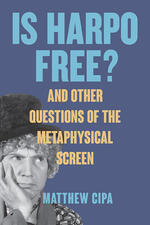
Savoring the Artistry of Film and TV
Guest post by Matthew Cipa
My siblings and I grew up watching The Marx Brothers, and my favorite of the brothers has always been Harpo. I was the youngest Marx Bros. viewer in my family, and so as a boy a lot of Groucho’s wordplay went over my head. Harpo’s cosmic chaos, though, registered with me then and continues to do so now. When I watch the mute Marx in full flight – in films like Night at the Opera (1935), Monkey Business (1931), and A Day at the Races (1937) – I still experience the joy I did as a child when I first watched him unleash chaos onscreen.
As the title of my new book Is Harpo Free? suggests, Harpo motivates a range of responses for me now. He wasn’t the initial motivation for writing it though. As an undergraduate, I found myself quite taken by scholarly work on films and television programs that sought to establish their philosophical value. And taken though I was, I often found myself puzzled by claims that a film’s philosophical value might be measured in philosophical terms – the way in which a film might be said to make an argument, or the quality and sophistication of that argument, say. This struck me as strange because when I watched films like Run Lola Run (dir. Tom Tykwer, 1998) or High Noon (dir. Fred Zinnemann, 1952) or We Need to Talk about Kevin (dir. Lynne Ramsay, 2011) I was captivated not by arguments about free will, goodness, or subjective experience respectively, but rather their cinematic evocations of such concepts. Likewise, a television program like The Americans (2013—2018) does not so much make an argument about the nature of personal identity, rather it functions as an exquisite exploration of the intricacies of that concept. The program is richly detailed and thought-provoking, and offers compelling ideas about the social realities of one’s individual identity, and the ways in which we try to “write” narratives about ourselves to understand who we are and our place in the world.
The Americans and the films mentioned above (and indeed, all the works I consider in Is Harpo Free?) do not, in my view, offer strictly philosophical arguments about the concepts and ideas that they, as works of art, take seriously (this is fortunate for me, as I have long found philosophy “proper” to be a frustrating and uphill battle). So, what do the films and television programs I consider in Is Harpo Free? do, exactly? I suggest they use the artistic capacities of film and television – everything from narrative storytelling to cinematography, lighting and color to sound – to give concepts like free will and causality, goodness, qualia (what it is like to have a particular subjective experience) and personal identity as an artistic life rather than a traditionally philosophical one. This is important because they are first and foremost works of art, and so celebrating them, appreciating them, and taking pleasure in them resides in treating them as works of art, rather than misidentifying them as works of philosophy. Ultimately, though, my point is that in properly appreciating film and television programs as works of art involves being attuned to how they artistically explore a variety of philosophical ideas (should they be present).
In drawing out the ways in which select works explore metaphysical concepts, I hope to show that films and television programs are uniquely capable of encouraging us to wonder about ourselves, the world, and our place within the world. The value of, and dare I suggest the pleasure in, asking a question like “is Harpo free?” is not so much to arrive at a definite answer, but instead to engage with art in a way that takes its artistry seriously. Indeed, to engage with it in a perspective of gratitude for its artistic features and the pleasures that they motivate.
Matthew Cipa is Lecturer at the Queensland University of Technology, Australia and affiliate academic in the School of Languages and Cultures at the University of Queensland, Australia.


